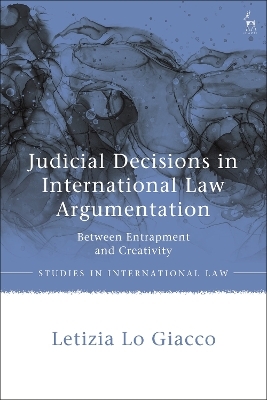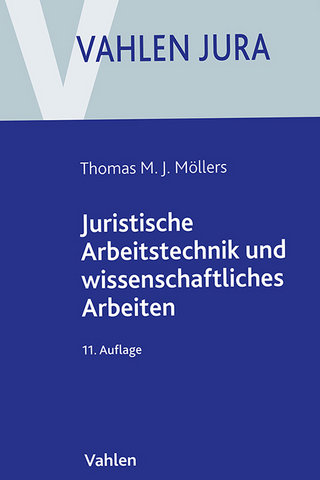
Judicial Decisions in International Law Argumentation
Hart Publishing (Verlag)
978-1-5099-4898-7 (ISBN)
Instead of taking the road of the sources of international law, this book turns to the somewhat uncharted terrain of legal argumentation. Using international criminal law as a case study, it shows how the growing number of judicial decisions has normalised courts’ resort to them in legal justification and enabled some argumentative practices to become constitutive of international law. In so doing, it critically revisits the implications of an iterative use of judicial decisions, and reassesses the influence of the ‘judicialisation turn’ on the ways in which the meaning of international law is formed, shaped and reshaped by reference to judicial decisions.
Letizia Lo Giacco is Assistant Professor of Public International Law at Leiden University, the Netherlands.
1. Introduction
I. The ‘Judicialisation Turn’ in International Law
II. Arguments
III. Legal Interpretation as a Form of Argumentation
IV. Scope and Limits of the Book
V. Book Outline
2. Courts and the Argumentation of International Law
I. A Legal Realist Perspective on Courts
II. Discretion in Legal Interpretation
A. Rule-Bound Justification
B. Choosing between Competing Courses of Action
III. Courts’ Argumentation: Between Logic and Persuasion
IV. Governing Judicial Decisions
A. Following Judicial Decisions: An Internal Perspective
B. Judicial Decisions as a Sufficient Basis of Justification in the Practice of International Criminal Law?
3. Rethinking Judicial Decisions beyond Formal Architectures
I. Genesis and Historical Development of International Criminal Law: A Plurality of Courts
II. General Effects of Regime Development
III. The Seeds of Universalism
IV. National Courts and International Crimes
V. Approaching Judicial Decisions in National Adjudication
VI. Courts Citing Judicial Decisions: An Interim Evaluation
4. The Entrapment of Judicial Decisions
I. Citing Judicial Decisions as a Structuring Device: Incrementalism versus Revisionism
II. The Road Towards the Stabilisation of Interpretive Outcomes
A. Interpreting ‘Protected Group’ in Genocide Cases
B. Discretion in the Interpretive Practices of ‘Protected Group’
C. Accepting Interpretive Outcomes: The Import of the ICC Statute
D. Interpretation as an Incremental Process of Content Formation
III. Deferring to the International Acquis: The Role of National Courts in Interpreting ‘Protected Group’
IV. From Stabilisation to Perfect Alignment of Interpretive Outcomes: The Case of ‘Armed Conflict’
A. The Concept of Armed Conflict in International Jurisdictions
B. National Courts between Entrapment and Revisionism
V. Interim Conclusions
5. Rewriting the Meaning of International Law
I. Social Acceptance as a Validator of Correctness: Any Room for Change?
II. Departing from the ‘Established Jurisprudence’: The Case of Genocide
III. Revisiting the Concept of ‘Unlawful Combatants’
IV. Managing the Flow of Arguments through Epistemic Superiority
V. Judicial Decisions as ‘Persuasive Authority’
VI. Authoritative Statements as Knowledge on International Criminal Law
6. Rethinking the Judicialisation Era
I. Structural Changes in International Legal Argumentation
II. Judicial Decisions as Epistemic Tools in the Argumentation of International Law
III. Reassessing the Role of Judicial Decisions in International Law: A Retrospective
IV. The Way Forward: A Prospective
| Erscheinungsdatum | 03.04.2024 |
|---|---|
| Reihe/Serie | Studies in International Law |
| Verlagsort | Oxford |
| Sprache | englisch |
| Maße | 156 x 234 mm |
| Themenwelt | Recht / Steuern ► Allgemeines / Lexika |
| Recht / Steuern ► EU / Internationales Recht | |
| ISBN-10 | 1-5099-4898-8 / 1509948988 |
| ISBN-13 | 978-1-5099-4898-7 / 9781509948987 |
| Zustand | Neuware |
| Informationen gemäß Produktsicherheitsverordnung (GPSR) | |
| Haben Sie eine Frage zum Produkt? |
aus dem Bereich


